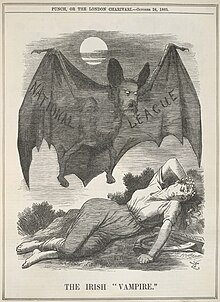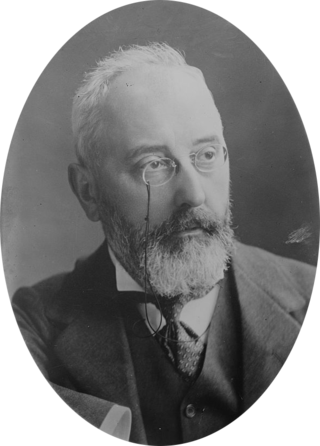
Timothy Michael Healy, KC was an Irish nationalist politician, journalist, author, barrister and a controversial Irish Member of Parliament (MP) in the House of Commons of the United Kingdom of Great Britain and Ireland. His political career began in the 1880s under Charles Stewart Parnell's leadership of the Irish Parliamentary Party (IPP) and continued into the 1920s, when he was appointed as the first governor-general of the Irish Free State.
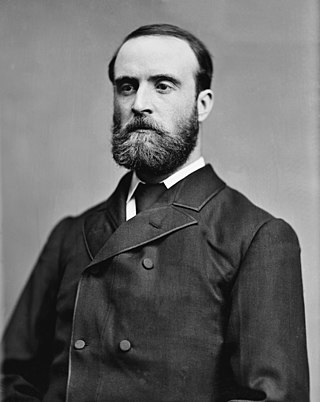
Charles Stewart Parnell was an Irish nationalist politician who served as a Member of Parliament (MP) in the United Kingdom from 1875 to 1891, Leader of the Home Rule League from 1880 to 1882, and then of the Irish Parliamentary Party from 1882 to 1891, who held the balance of power in the House of Commons during the Home Rule debates of 1885–1886. He fell from power following revelations of a long-term affair, and died at age 45.
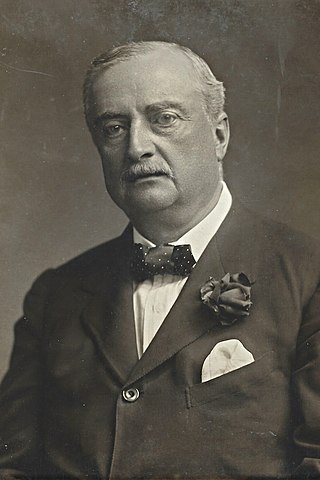
John Edward Redmond was an Irish nationalist politician, barrister, and MP in the House of Commons of the United Kingdom. He was best known as leader of the moderate Irish Parliamentary Party (IPP) from 1900 until his death in 1918. He was also the leader of the paramilitary organisation the Irish National Volunteers (INV).
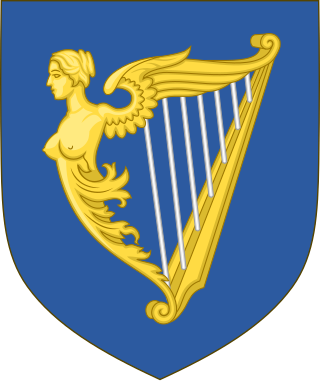
The Irish Parliamentary Party was formed in 1874 by Isaac Butt, the leader of the Nationalist Party, replacing the Home Rule League, as official parliamentary party for Irish nationalist Members of Parliament (MPs) elected to the House of Commons at Westminster within the United Kingdom of Great Britain and Ireland up until 1918. Its central objectives were legislative independence for Ireland and land reform. Its constitutional movement was instrumental in laying the groundwork for Irish self-government through three Irish Home Rule bills.

William O'Brien was an Irish nationalist, journalist, agrarian agitator, social revolutionary, politician, party leader, newspaper publisher, author and Member of Parliament (MP) in the House of Commons of the United Kingdom of Great Britain and Ireland. He was particularly associated with the campaigns for land reform in Ireland during the late 19th and early 20th centuries as well as his conciliatory approach to attaining Irish Home Rule.
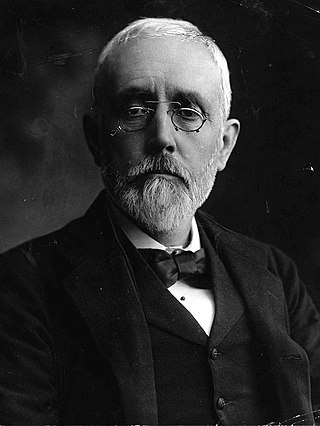
John Dillon was an Irish politician from Dublin, who served as a Member of Parliament (MP) for over 35 years and was the last leader of the Irish Parliamentary Party. By political disposition, Dillon was an advocate of Irish nationalism, originally a follower of Charles Stewart Parnell, supporting land reform and Irish Home Rule.
The Nationalist Party was a term commonly used to describe a number of parliamentary political parties and constituency organisations supportive of Home Rule for Ireland from 1874 to 1922. It was also the name of the main Irish nationalist Nationalist Party in Northern Ireland from 1921 to 1978.

Michael Davitt was an Irish republican activist for a variety of causes, especially Home Rule and land reform. Following an eviction when he was four years old, Davitt's family migrated to England. He began his career as an organiser of the Irish Republican Brotherhood, which resisted British rule in Ireland with violence. Convicted of treason felony for arms trafficking in 1870, he served seven years in prison. Upon his release, Davitt pioneered the New Departure strategy of cooperation between the physical force and constitutional wings of Irish nationalism on the issue of land reform. With Charles Stewart Parnell, he co-founded the Irish National Land League in 1879, in which capacity he enjoyed the peak of his influence before being jailed again in 1881.
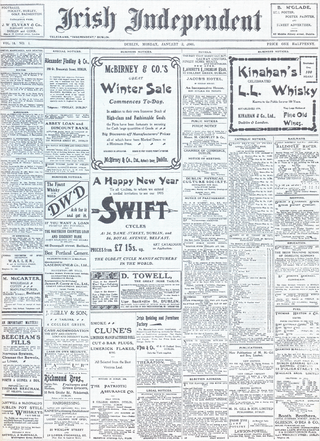
The Daily Irish Independent was an Irish newspaper launched in the 1890s to promote the pro-Parnellite cause following the split in the Irish Parliamentary Party over Parnell's continuing leadership. The party had split following the revelation that Parnell had been involved in a long-running relationship with Katharine O'Shea, the wife of a fellow MP, and was the father of most of her children.
North Kilkenny was a parliamentary constituency in Ireland, represented in the House of Commons of the Parliament of the United Kingdom. It returned one Member of Parliament (MP) from 1885 to 1922.

The Land War was a period of agrarian agitation in rural Ireland that began in 1879. It may refer specifically to the first and most intense period of agitation between 1879 and 1882, or include later outbreaks of agitation that periodically reignited until 1923, especially the 1886–1891 Plan of Campaign and the 1906–1909 Ranch War. The agitation was led by the Irish National Land League and its successors, the Irish National League and the United Irish League, and aimed to secure fair rent, free sale, and fixity of tenure for tenant farmers and ultimately peasant proprietorship of the land they worked.

The Irish National Federation (INF) was a nationalist political party in Ireland. It was founded in 1891 by former members of the Irish National League (INL), after a split in the Irish Parliamentary Party (IPP) on the leadership of Charles Stewart Parnell. Parnell had refused to resign his leadership of the party after being named in divorce proceedings against Katharine O'Shea by the former MP William O'Shea. In the aftermath of the divorce, William Ewart Gladstone, leader of the Liberal Party, had declared that he would not work with Parnell, damaging the parliamentary alliance between the IPP and the Liberals.
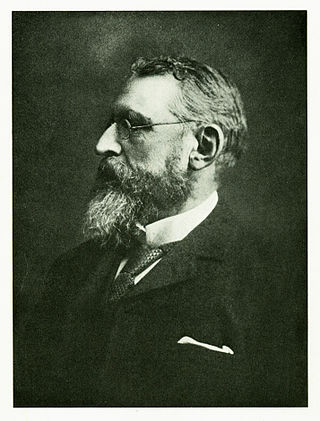
The United Irish League (UIL) was a nationalist political party in Ireland, launched 23 January 1898 with the motto "The Land for the People". Its objective to be achieved through agrarian agitation and land reform, compelling larger grazier farmers to surrender their lands for redistribution among the small tenant farmers. Founded and initiated at Westport, County Mayo by William O'Brien, it was supported by Michael Davitt MP, John Dillon MP, who worded its constitution, Timothy Harrington MP, John O'Connor Power MP and the Catholic clergy of the district. By 1900 it had expanded to be represented by 462 branches in twenty-five counties.
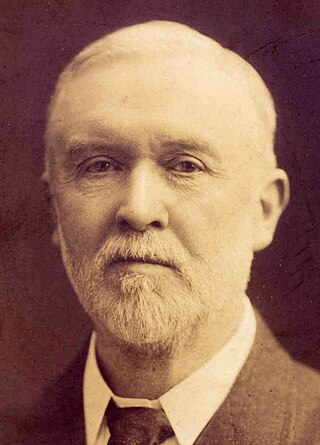
John Joseph Clancy, usually known as J. J. Clancy, was an Irish nationalist politician and Member of Parliament (MP) in the House of Commons for North Dublin from 1885 to 1918. He was one of the leaders of the later Irish Home Rule movement and promoter of the Housing of the Working Classes (Ireland) Act 1908, known as the Clancy Act. Called to the Irish Bar in 1887, he became a King's Counsel in 1906.

Patrick O'Brien was Irish Nationalist MP in the House Of Commons of the United Kingdom of Great Britain and Ireland and as member of the Irish Parliamentary Party represented North Monaghan (1886–1892) and Kilkenny City (1895–1917). He was Chief Whip of the Irish Party from 1907 until his death in 1917.

Jeremiah JordanJ.P. was an Irish nationalist politician from County Fermanagh. He was a Member of Parliament (MP) from 1885 to 1892, and from 1893 to 1910, taking his seat in the House of Commons of the United Kingdom of Great Britain and Ireland.

Thomas Sexton (1848–1932) was an Irish journalist, financial expert, nationalist politician and Member of Parliament (MP) in the House of Commons of the United Kingdom of Great Britain and Ireland from 1880 to 1896, representing four different constituencies. He was High Sheriff of County Dublin in 1887 and Lord Mayor of Dublin from 1888 to 1890. Sexton was a high ranking member of the Irish Parliamentary Party, raised up by Charles Stewart Parnell himself. However, Sexton broke with Parnell and joined the Anti-Parnellites in 1891 following Parnell's marriage scandal. Sexton was disheartened by the subsequent infighting amongst the Anti-Parnellites and pulled back from politics. He thereafter became the chairman of the Freeman's Journal, one of the largest newspapers in Ireland.

James Joseph Dalton was an Irish nationalist Member of Parliament (MP) for West Donegal from 1890 to 1892.

The 1892 general election in Ireland took place from 4–26 July 1892. This was the first general election in Ireland following the split in the Irish Parliamentary Party caused by Charles Stewart Parnell's relationship with Katharine O'Shea, who had been married at the beginning of their relationship. The ensuing scandal saw the Party split into rival wings; the anti-Parnellite Irish National Federation, and the pro-Parnellite Irish National League. Parnell later died in October 1891 of a heart attack.

The 1900 United Kingdom general election in Ireland was held in September and October 1900. Ninety-nine of the seats were in single-member districts using the first-past-the-post electoral system, and the constituencies of Cork City and Dublin University were two-member districts using block voting.
